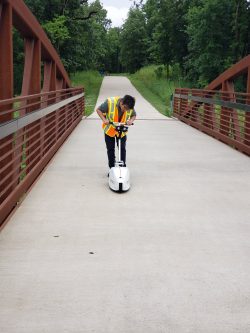InTrans / Jan 11, 2023
CTRE project tackles trail management

The Center for Transportation Research and Education (CTRE) has long overseen a robust pavement management program to support local agencies with their roadways. Now, its researchers are turning that expertise to aid local jurisdictions in Central Iowa with pavement management of a different sort.
As Iowa local agencies are responsible for more than 600 miles of paved bike and pedestrian trails that connect the central-state region—a network that is starting to show its age—they have a need for pavement condition data to determine maintenance needs.
“As the network of paved trails grows, local governments will need to redirect their spending toward preserving and maintaining the existing trails,” said Inya Nlenanya, CTRE research scientist and principal investigator (PI) on the project to help establish a trail management program for Central Iowa.
The role of CTRE, a center within the Institute for Transportation (InTrans), is to use the data collected by the Iowa Data Bike as the basis for the development of the trail management program for all paved trails within Central Iowa for the use of the Des Moines Area Metropolitan Planning Organization (MPO) and its member cities and counties, as well as partner organizations. The overall goal of the program is to help inform a long-term maintenance strategy for Central Iowa’s trail network.
The CTRE project will develop a crack detection and automated distress calculation methodology, a roughness index calculator, and a trails pavement condition index for the trail pavement data collected by the MPO’s Iowa Data Bike.

In addition to pavement condition data, the bike data will be used for other purposes to benefit the local agencies and users of the trail system, including Google Street View images and geocoded imagery.
InTrans doctoral students Yazan Alatoom and Zia Zihan are assisting Nlenanya with the project. Zihan is assisting with the data collection and image detection, and Alatoom is helping to develop the algorithm for measuring the pavement roughness.
“Regular pavement condition data collection occurs for street networks, but no such data had been collected for paved trail networks until the Iowa Data Bike. This was because prior to the Iowa Data Bike, there was no equipment available for collecting trail pavement condition data, as the equipment used for roadways is too big and requires speeds that are not suitable for usage on the trails,” said Nlenanya.
The project also represents a new area of study for the center and expands InTrans’ role in working with local agencies in the state.
The project, which began in the spring of 2022, is expected to wrap up early in 2023 with a plan to extend it beyond Central Iowa.
